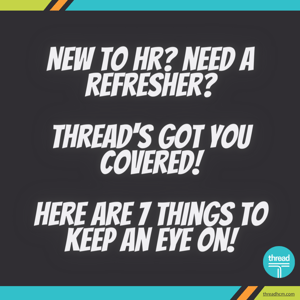TRANSCRIPT | Thread Connects: Future of Work: How to Work Now | Part 2
Lori Winters, CEO of Thread, interviews Scott Mastley, CHRO, to discuss the actionable steps businesses need to be taking now in light of COVID-19 and racial unrest. In part two of this interview, we discuss racial unrest and the measures you should be taking to protect your business and your team.

Lori Winters:
I want to pivot for a second and move away a little bit from the COVID-19 and into the other thing that's going on in the world right now, which is more around racial inequality and unrest that's going on out there, and it's causing challenges for a lot of people and a lot of companies. I was wondering, do you have some thoughts around actionable items that leaders and managers can take, number one, to create more of an inclusive corporate or company environment, and then, to add onto that, are there some trainings or things that we should be doing to train our managers to make sure that we're creating an inclusive environment and that we're also staying compliant?
Scott Mastley:
Mm-hmm (affirmative). Yeah, that's a big question and there's a lot to that. There are things that the leadership can do of a company to say, "Now's a good time for us to evaluate our diversity." Not a diversity program, but true diversity in your business. Do you have that or not? If you have it and people treat each other respectfully and you have a good positive culture where employees are comfortable voicing their opinions and having a respectful conversation, that kind of thing, and you do have diversity, then do you need a separate diversity program? I don't know. But if you don't have that, then maybe you do need to think about having some kind of diversity program.
Scott Mastley:
For small businesses, it's not the same as what you typically read about. If you're watching Twitter or Google or Amazon, what they do is going to be a whole different thing. Teams and committees and officers, our clients aren't going to have all that. But what they can do is make an effort to say, "Okay, let's talk about who we are and how we do things." And the leaders can state their support right out of the gate like you did with us. You said, "Hey, I don't understand all this either but I'm with you and we're stronger together." And you need to look at your harassment and discrimination policies, your equal employment opportunity policy, see if those need to be updated. You need to evaluate your diversity program, like I said, make sure people understand that it is okay to discuss things that are on their mind, but it's got to be done in a respectful way, and that in private businesses, free speech is not protected like it is out on the street when you're protesting or something like that.
Lori Winters:
Right.
Scott Mastley:
Businesses can limit what people can talk about. So you could have a policy that said, "Any conversations at work need to be about work related topics." Now, that policy is unrealistic. It's never going to happen. So it's going to be hard to enforce. So instead you could say something like, "We encourage you to avoid inflammatory topics such as politics, religion, things that tend to challenge and cause arguments rather than respectful debate."
Lori Winters:
Right.
Scott Mastley:
Or you can talk about being disruptive at work. So you could say, "Look, any actions that are disruptive or offensive to others could be addressed." For example, if I wear a shirt to work that has a slogan that I know is just going to rile people up, you can say, "Look, you have every right to feel that way, have that opinion, but you can't wear that shirt to work because it's disruptive. Not because we agree or disagree with your opinion, but you're causing a disruption at work."
Lori Winters:
Right. To add onto that, I think the hardest part is you, as a business leader, can have certain ideals and believe that you're running an inclusive, being very inclusive, company and diverse company, and diversity, for me, diversity just makes us all stronger.
Scott Mastley:
Mm-hmm (affirmative).
Lori Winters:
And I value that, but you can only be as strong as the rest of the leaders and managers on your team.
Scott Mastley:
Right.
Lori Winters:
So what kind of training? First of all, I think it comes down to who you hire and who you promote into manager level roles, but what kind of training do you think is important for managers to be able to make sure that they don't have bias when they're hiring, when they're recruiting, when they're interviewing and when they're managing and doing performance reviews? What kind of training can we help with our managers with?
Scott Mastley:
Well, there's unconscious bias training, which taps into some of the things that they may or may not be aware of. But you have to go back to, how did people grow up? Where did they go to school? Where did they go to church? What did their parents tell them? What do they watch on TV? All of these things have an influence on how we frame our view of the world and how we react to events that are happening around us. You've got to go deep on that if you want to. But then you can start to address just specifically, how do you communicate when you may feel a reaction internally? And I wrote down a few good tips here. So if you're talking to people about how to have a conversation that focuses on respect, just a few tips, one is assume a positive or neutral intent from the person you're talking to.
Scott Mastley:
So don't assume they're trying to bait you or start a fight. Treat communication as a dialogue, not a debate. Don't just wait for them to finish. That's the old Stephen Covey thing. Actually listen to learn, not just for your turn.
Lori Winters:
Right.
Scott Mastley:
Be an active listener there. Approach topics you don't fully understand with humility, which starts by acknowledging that maybe I don't know it all and maybe your perspective is different from mine and I'm willing to learn. Instead of going, "But, but, but, but, but, but, let me tell you about me," just be quiet and be willing to listen a little bit and learn a little bit about something else. And that's how you start to understand how people have different experiences and different perspectives. Acknowledge the concepts of right or wrong are very subjective.
Lori Winters:
Absolutely.
Scott Mastley:
Taste, right? All those things are what people think they are. So there is no universal. Consider tough conversations personal growth, which means be open to them. Avoid generalizations, such as "all,” “you all." That kind of stuff is bad. And just be respectful. Non-inflammatory language. And then there are things you can share with your team as well. We sent out a list and said, "Okay, what can we do as just people to help with this." And we said, "There's an issue with racial equality out here in America. What can we do as people?" We can have conversations with our friends. We can decide personally not to tolerate racism or things like that.
Lori Winters:
Right.
Scott Mastley:
We can vote. We can sign petitions. We can peacefully protest. Businesses may even say, "You know what? If you want to participate in a protest, we'll give you a paid day off for that." They have to think about their social media policies. Are businesses going to get upset if somebody is real political on their personal social media pages? And you've got to be careful with that.
Lori Winters:
That's a very good point. So you're trying as a business leader to create an inclusive environment and then you have an employee who decides to go a little rogue on their social media and they're not aligned with your views around being inclusive, what can you do about that? Or can you do anything?
Scott Mastley:
Yeah. Well, as a business, you just have to have a good social media policy that says, "You have a right to your own opinion. You cannot represent the company on your personal social media outlets. You can't be wearing your company shirt with a logo on it blasting someone or whatever." So it needs to say that they separate. You even have to have a disclaimer if you're going to say inflammatory things that this is my personal opinion, it does not reflect on my employer. And then your policy basically says, "Look, you can do whatever you want out there, but if what you do violates our harassment policy or is bullying or threatening or any of those things, then we've got to take action on that just as if you were saying those things in the hallway at work."
Lori Winters:
So can you do that as a leader or manager, if you had an employee who you saw post something on social media that was very racially biased and negative, almost like you're saying to a point of bullying, can I do anything about that even though that's their own personal social media?
Scott Mastley:
Yes, you can. I mean, you can say to employee, "What you're doing represents us in such a negative light that it could affect our business. If you are associated with our business, it could affect our business." And bigger companies do have that real issue with sponsors pulling out.
Lori Winters:
Right.
Scott Mastley:
You've seen that on TV and radio and that kind of thing, but you've also seen stories where their most recent one was a guy in Costco, I think, who wasn't wearing a mask and started yelling at people and all that kind of stuff. And a lot of people seen that video and he got fired from his job because they said, "You don't represent us. You don't fit with us, and we're an at will employer." At will means you can let someone go for any reason that's not illegal. And I think anybody could make the case that if you're a salesman for our company and you're out there generating ill will in the community, that's not going to play out well.
Lori Winters:
Right. Last question on the bias. I think about hiring, the hiring and recruiting, the bias that managers can have, and we've all seen it, sometimes you look for people like yourself, or sometimes you look for people totally opposite of yourself.
Scott Mastley:
Yeah.
Lori Winters:
Do you have any training or ideas of, if you're teaching a new manager on how to recruit and interview and hire without that kind of bias, what would you tell them? How would you train them to not think about, you're looking at a resume, how do you not have that bias for whatever reason you may have?
Scott Mastley:
Yeah, there's a lot to this question. It's a great question. One is, be aware of what your negative and positive biases are. I'm a big UGA fan because it's such a great university, so much better than Georgia Tech, and if I'm interviewing somebody-
Lori Winters:
I don't know how you'd slip through the recruiting process.
Scott Mastley:
So if I'm interviewing somebody who is a Georgia Bulldog, I may automatically attached to that, and HR folks would call that "the halo effect", which is there's one thing about you that I like so everything about you glows but I don't see it.
Lori Winters:
Right.
Scott Mastley:
So there's a lot to that. So there are things you can do to get around that. One is you use things that help you learn as much as you can about the client. So do you use assessments, right?
Lori Winters:
About the recruit, the employee? You said client.
Scott Mastley:
Yeah, you're interviewing a candidate. You have them take an assessment or multiple assessments, if you want. And you may even have them take competency tests related to the position they're applying for to see if they're competent or not. And those are just extra tools that help you make a decision. You also make a collective hiring decision. Instead of being the only person who interviews someone, have other people interviewed, and you can set that up like I used to do it where I would say, "We're going to have three people interview this candidate. My job is I am interviewing them for competence. Do you know how to do the job? Tell me how you do the job. I'm going to test what you know and I'm going to grill you on it pretty hard."
Scott Mastley:
I like everybody because I'm just that kind of person, I'm drawn to people. I'm interested in them. So I had other people who didn't like everybody say, "You're going to interview this person for their personality to see if they're a fit at work. If they're irritating to you, then that's all I need to know. I didn't even know what or why, if they got on your nerves or were irritating as you were interviewing them, then they're going to get on our nerves when they're working with us too." So that's important to know, because part of it is, do you want to do the things you're going to do in the job every day? Are you capable of doing the things you're going to do in the job every day? And will the people around you want to be around you while you're doing the things you're going to do every day." So all of that has to be evaluated somehow.
Scott Mastley:
You can set up a structured interview where you ask the same questions of everybody. That way everybody gets the same set. That's fair. And then you can also train managers when they're interviewing not to make common mistakes. One of the biggest mistakes interviewers make as they match stories. So if you said to me, "Oh yeah, I was just fishing last weekend," and I go, "Oh yeah, let me tell you about when I was fishing," now we just wasted the interview bonding over something that has nothing to do with this job.
Lori Winters:
Right.
Scott Mastley:
And that's also a way that people get sucked into that "halo effect" is matching those stories, right?
Lori Winters:
Right.
Scott Mastley:
So you just want it to be as objective as possible, have multiple inputs into that decision, whether that's people or tools, or all of the above. Check backgrounds, check references. Have a process that you follow with every candidate so it's not different for each person. And all of that helps you eliminate that unintended bias that may creep in just by having individual biases that people bring to the table.
Lori Winters:
Right. That's awesome. Yeah, it's hard. It's a challenge but I think, like you're saying, the more you can make it as objective as possible by using some of those tools, but you still want to make sure that there's a fit from a core value perspective. Because as you build a company around certain core values, you want new people or you want your team to also align with those core values. And, to me, that's not just about me and the business, it's also about the employee, the potential employee, the candidate, because you don't want them to be in a position where longterm they're not going to be happy in that environment anyway.
Scott Mastley:
For sure.
Lori Winters:
So I think there's a lot of ways to make it objective, and then this is the last comment, but to piggyback on that from a growth perspective, once you get the employees in and the candidate and the team members in making sure that you're inclusive and you're making objective decisions on who is rising through the ranks of the business. It can't just be people that you like to hang out with, it also has to be very much metrics and those objective criteria, to me, are so important so that you are making the right decisions as to who is going to grow within the organization as well. Anything on that?
Scott Mastley:
Well, I think it comes from the top.
Lori Winters:
Right.
Scott Mastley:
So I remember there was an old story when I was in grad school and they talked about a case study where all of these managers had to call every single week and all it took was the person who was running the meeting, who was the CEO of the company, to ask a certain question. And whenever that question was asked everybody on the call knew, oh, that might come up again next week, I better be prepared for that. And all of a sudden it became important to them. So what the owner or the leaders of the company ask about sends a pretty strong message. Also, you've heard me say this before, the things that you ignore and allow to exist send a message equally as strong as the behaviors that you expect and reinforce. So if you look the other way, people think it's okay.
Lori Winters:
Absolutely. Yeah. Totally agree. Well, Scott, thank you so much. I'm sure we're going to be doing some more of these because the piece of the HR outsourcing and the thread engage product business that you're representing for us is so important. And I've gotten to see personally how you have helped so many of our clients. So thank you for today and this information's going to be great for our clients and our prospects. So thank you and we'll talk soon.
Scott Mastley:
All right.
Lori Winters:
All right. Bye Scott.
Scott Mastley:
See you later.
-END OF TRANSCRIPT FOR PART 2 OF INTERVIEW (FINAL)-












